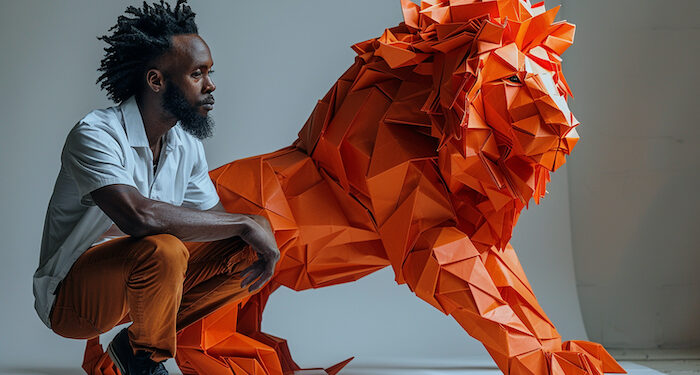African creators are shaping global culture, but too often, they do so without ownership, recognition, or fair pay. From Burna Boy’s landmark 2021 neighbouring rights deal with Kobalt to Nollywood filmmakers pivoting to YouTube after streaming platforms scaled back African commissions, flashes of promise coexist with deep structural vulnerability.
At the 2025 Met Gala, designers like Thebe Magugu and Anifa Mvuemba showcased Africa’s creativity on the world stage, yet millions of TikTok creators across the continent earn virtually nothing, despite viral influence.
This tension reveals a harsh truth: Africa produces culture the world wants, but its creators often don’t control it.
Who holds the keys?
Creative sovereignty is more than monetisation; it’s about protecting the dignity of African ideas. Economic rights allow creators to earn from their work. Moral rights allow them to claim authorship and preserve the integrity of their creations.
Both exist in international law, most ARIPO and OAPI member states have ratified the Berne Convention, but outdated registries, analogue processes, and prohibitive costs make enforcement slow or inaccessible.
Many African creators, especially first-timers or informal entrepreneurs, remain excluded from the full benefits of ownership. IP literacy is now as urgent as legal reform: without knowledge of rights and processes, creators are vulnerable to exploitation, even when the law exists.
The stakes: Cultural and economic
When African creativity leaves the continent without fair compensation, cultural and financial value leaks out. Streaming platforms, licensing deals, and global distributors often frame exposure as payment, but exposure doesn’t pay rent.
High subscription fees, currency conversion hurdles, and limited monetisation options mean African artists are underpaid even as global audiences grow. Afrobeats, streamed over 13 billion times on Spotify in 2022, illustrates this paradox: massive global reach, minimal local reward.
By contrast, when creators retain rights, the ripple effect is transformative. Local IP ownership fuels reinvestment into studios, apprenticeships, and cultural programmes, strengthening industries and shaping narratives with African voices.
Nollywood alone, the world’s second-largest film industry, generates over $1 billion annually and employs more than a million people. In South Africa, the cultural and creative industries contributed R161 billion to GDP in 2020, yet weak IP protections and underdeveloped infrastructure hinder the full potential of this sector.
Cultural appropriation and global pop culture
Exploitation also comes as unacknowledged cultural borrowing. South African designer Laduma Ngxokolo accused Zara of copying Xhosa-inspired knitwear in 2018. Music history is filled with similar stories: Solomon Linda’s 1939 Zulu song ‘Mbube’ became the 1960s hit ‘The Lion Sleeps Tonight, with profits flowing to cover artists for decades.
Even global pop culture borrows African aesthetics, from K-pop stars adopting dreadlocks to high-fashion houses using Ankara prints, without credit or investment in originators. These patterns underscore a systemic imbalance: African creativity is celebrated abroad, but African creators are often absent from the rooms where decisions and wealth are made.
The TikTok trap
TikTok is now Africa’s cultural heartbeat, with over 140 million users, yet monetisation largely bypasses the continent. The Creator Fund and its successors operate in the US, Europe, and parts of Asia, leaving African creators reliant on sporadic brand deals.
Viral content drives engagement, but not income, reinforcing a digital economy where influence is divorced from ownership. Until platforms localise monetisation, African creators remain the unpaid engines of global trends.
Reclaiming the narrative
If African culture is good enough to sell, it should be good enough to protect and invest in. Creative sovereignty requires shifting power from the margins to the centre: creators must be co-producers, CEOs, and IP owners, not just consultants. Governments, platforms, investors, and creative communities each have a role to play.
Governments must modernise IP laws, digitise registries, reduce filing costs, and ensure systems are accessible to informal and rural creators. Brands and platforms must embed fair-share clauses, offer local monetisation, and invest in the communities whose culture drives their campaigns.
Creative communities need to organise – through guilds, unions, or cooperatives – to build negotiating leverage, protect IP, and pool resources for shared growth. Investors should fund platforms and services that support ownership infrastructure: royalty tracking, legal assistance, education, and incubation.
Ownership starts where capital flows.
The work ahead
Creative sovereignty is not a side issue, it is central to Africa’s cultural and economic future. If African creativity is packaged and exported without ownership, the continent loses both revenue and narrative control.
But with fair, transparent systems, local IP can sustain an economy where creativity inspires and supports. African artists, designers, musicians, and digital creators don’t need permission to lead. They need tools, infrastructure, and policies that ensure they own their leadership, and the time to build them is now.
Sefiso Hlongwane is a seasoned marketing professional with over a decade of experience, having worked at esteemed organisations such as Joe Public, TRACE TV, and DNA Brand Architects. His passion for exploring marketing touchpoints and researching ways to leverage channels for societal impact drives his work. Sefiso is committed to innovation and has a proven track record of success across diverse marketing environments. In addition to his professional endeavours, he regularly provides commentary on media and marketing trends, offering insightful analysis that aims to make a meaningful difference in the industry and beyond.














